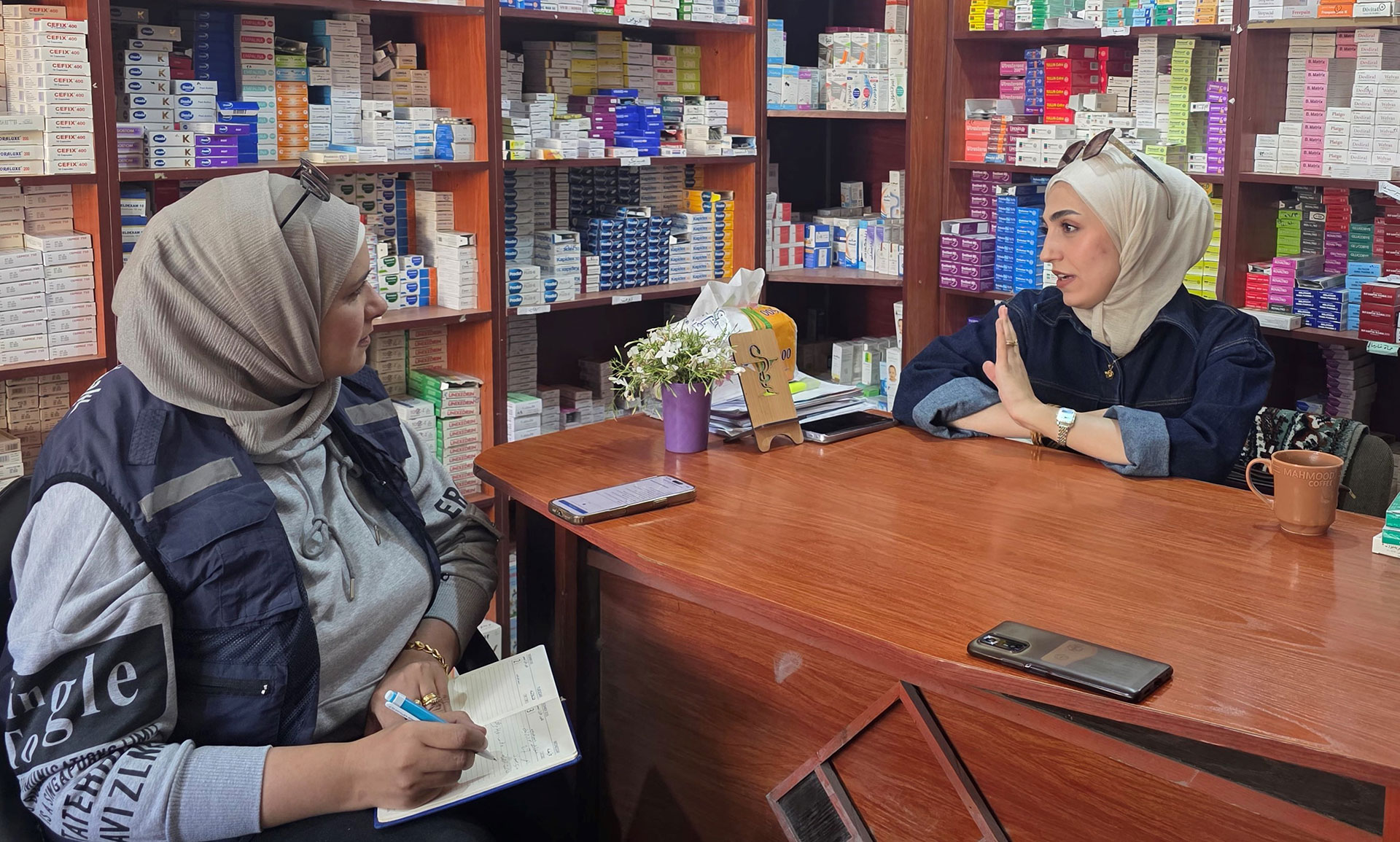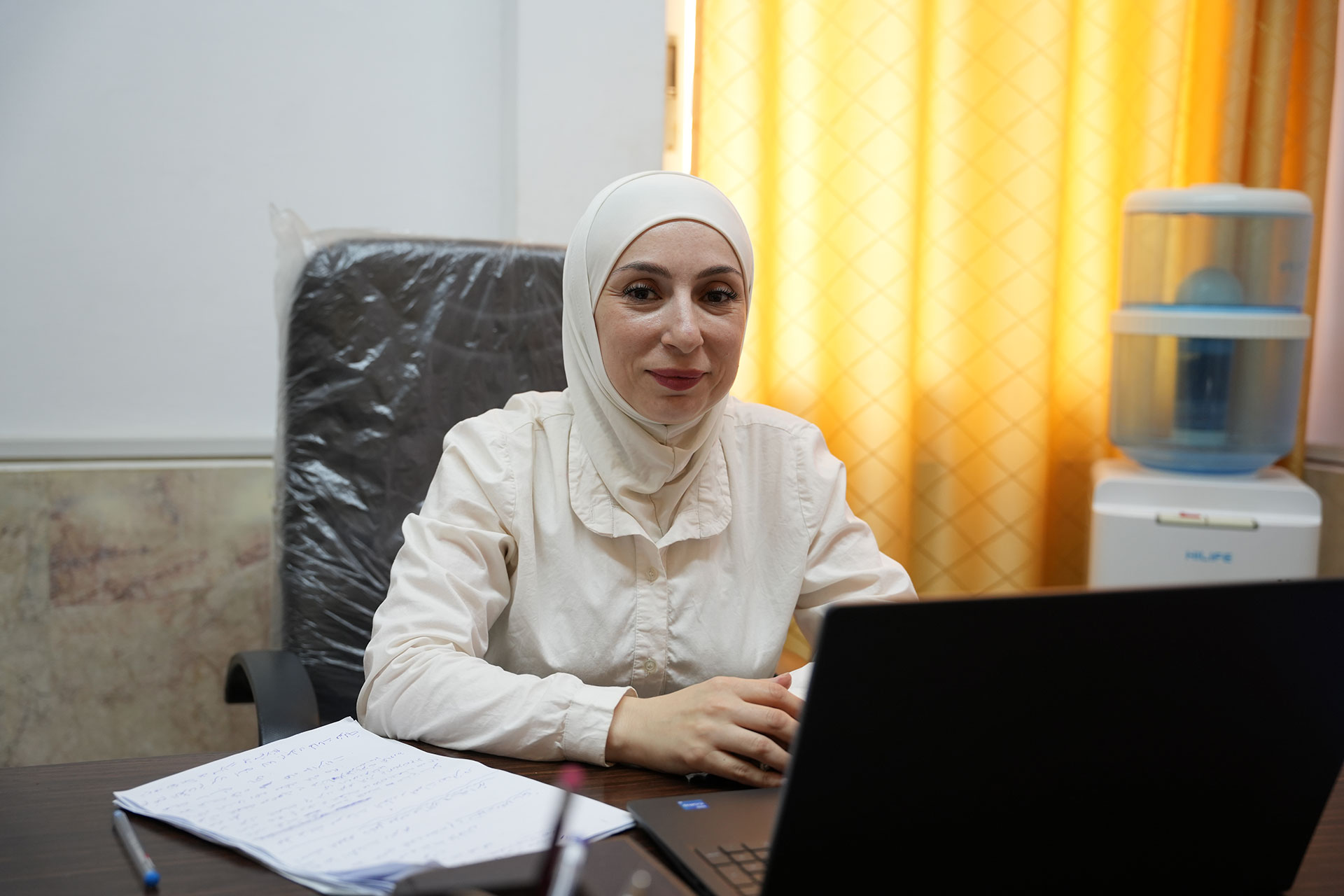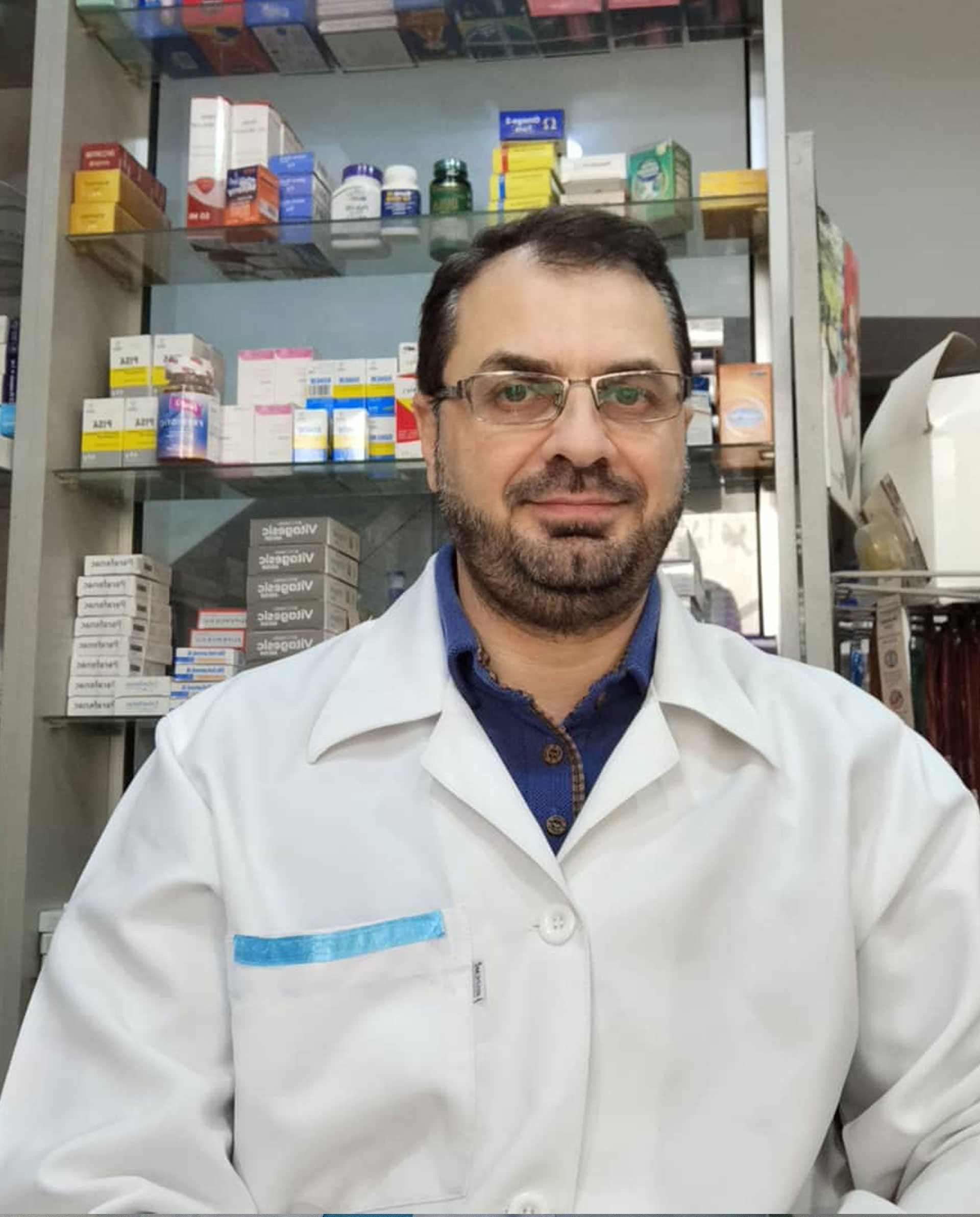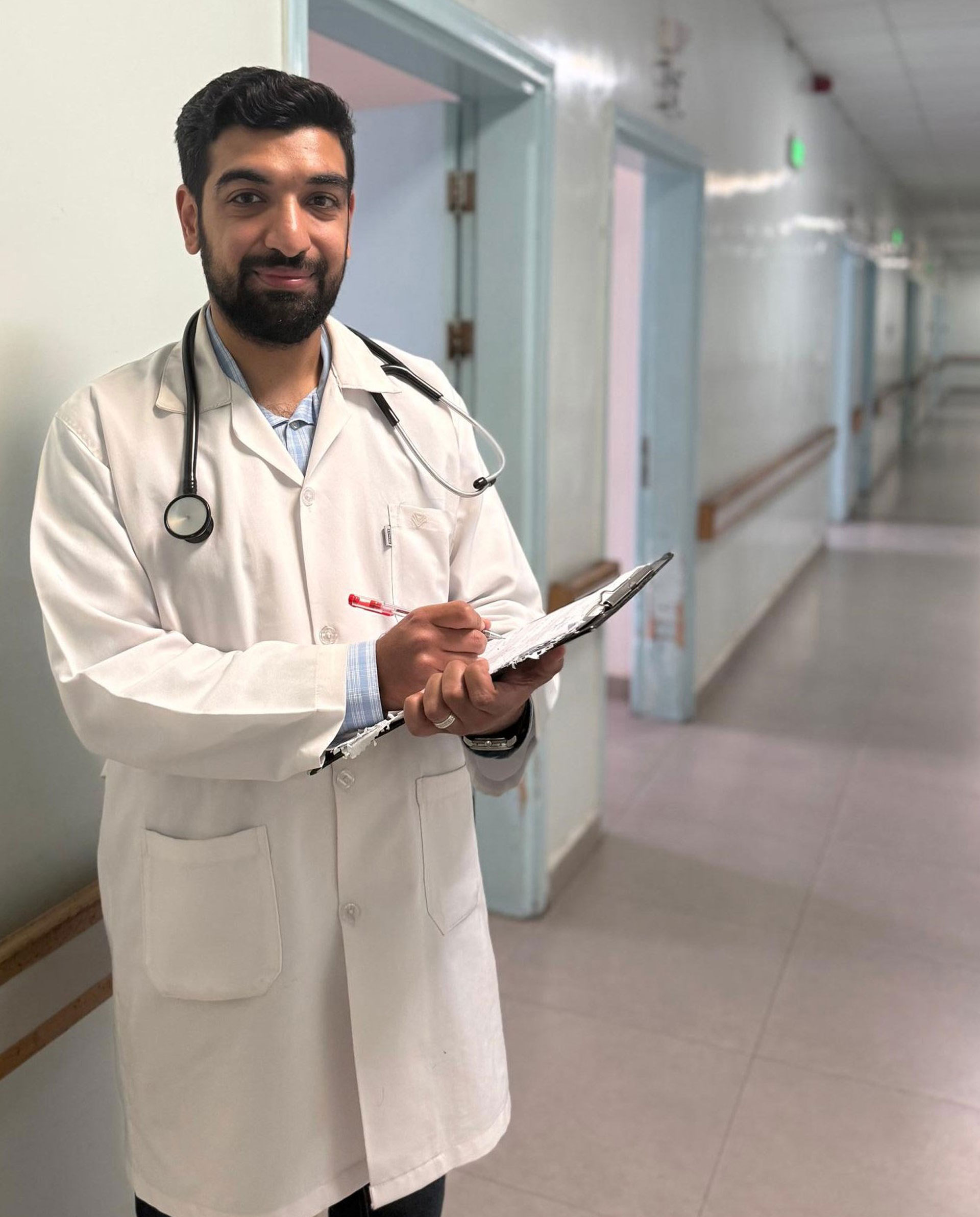 Malak Fouad, a pharmacist in Deir-ez-Zor, discusses local patterns of antibiotic use during a WHO visit. Photo credit: WHO 24 November 2025, Damascus, Syrian Arab Republic – Across Syria, health workers are raising their voices against the growing threat of antimicrobial resistance (AMR). In hospitals, clinics, and community pharmacies, they continue to guide families on the safe use of antibiotics — even as difficult living conditions make responsible use harder to maintain. Their experiences reveal a mix of challenges and determination, and a shared commitment to protect patients from infections that are becoming increasingly difficult to treat.
Malak Fouad, a pharmacist in Deir-ez-Zor, discusses local patterns of antibiotic use during a WHO visit. Photo credit: WHO 24 November 2025, Damascus, Syrian Arab Republic – Across Syria, health workers are raising their voices against the growing threat of antimicrobial resistance (AMR). In hospitals, clinics, and community pharmacies, they continue to guide families on the safe use of antibiotics — even as difficult living conditions make responsible use harder to maintain. Their experiences reveal a mix of challenges and determination, and a shared commitment to protect patients from infections that are becoming increasingly difficult to treat.
“Many families still believe antibiotics are the solution for any fever or seasonal cold. Convincing patients about the long-term effects of taking unprescribed medication is becoming increasingly challenging,” says Dr Malak Fouad Kharaba, a laboratory specialist at the National Hospital in Deir-ez-Zor.
 Afraa Mawardi, Head of the Drug Control Unit at the National Hospital in Lattakia, at her office, talks about the issue of antibiotic use. Photo credit: WHOShe notes that patient trust, accessible services, and community outreach remain essential to helping people understand when antibiotics are needed — and when they are not.
Afraa Mawardi, Head of the Drug Control Unit at the National Hospital in Lattakia, at her office, talks about the issue of antibiotic use. Photo credit: WHOShe notes that patient trust, accessible services, and community outreach remain essential to helping people understand when antibiotics are needed — and when they are not.
“With better living conditions, trust, and more awareness of the risks, we can protect patients and save more lives. Awareness campaigns can make a difference, but more effort is needed so that people can protect themselves and those they love,” she adds.
“The issue of antibiotic use is an old and continuing one. Most people understand the risks, but many are forced to seek antibiotics without consulting a doctor because they cannot afford a visit,” explains Afraa Mawardi, pharmacist and Head of the Drug Control Unit at the National Hospital in Lattakia. “We face two main problems — the random use of antibiotics and not completing the prescribed treatment.”
Dr Zein Ali Douba, an oncology specialist in Aleppo, discusses the consequences of antibiotic misuse for patients with weakened immunity. Photo credit: WHO Afraa stresses that ensuring steady availability of medicines and strengthening health centres can help curb misuse. “With continued support to health facilities and ongoing awareness, we can help people get the right treatment at the right time.”
Health workers also note that antibiotic resistance is driven by several interconnected factors beyond individual use. Antibiotics are widely used in livestock and agriculture, and residues can enter the environment through wastewater and soil. Many health facilities face challenges with infection prevention and control, which increases the need for antibiotics and raises the risk of resistant infections. Strengthening these systems through a OneHealth approach — from clean water and waste management to better regulation of agricultural use — is essential to slow the spread of resistance.
In Aleppo, the consequences of antibiotic misuse are especially severe for patients with weakened immunity.
“For oncology and hematology patients, even a minor infection can become dangerous if antibiotics no longer work,” says Dr Zein Ali Douba. “This is why avoiding unnecessary antibiotics — and consulting a doctor before taking any medication — is so important.”
She explains that limited prescription controls and the pressure on health facilities often leave vulnerable patients exposed to inappropriate treatments. “With stronger regulation of antibiotic sales and continued support to health centres, we can help protect patients who face the highest risks of resistant infections.”
For pharmacists like Kamal Al-Dallal in Hama, daily interactions with patients reveal both persistent misconceptions and gradual progress.
“Over the past 15 years, I have seen hundreds of patients who believe antibiotics can cure any infection and that stopping treatment early causes no harm,” he says.
At his pharmacy, many still request antibiotics without a prescription — even for conditions that do not require them. Yet Kamal notes that awareness is slowly improving. “With ongoing awareness efforts and proper training for health workers, we can ensure antibiotics remain effective for everyone who needs them.”
In Homs, frontline clinicians increasingly encounter respiratory infections that do not respond to standard treatments.
“Many patients have respiratory infections resistant to several antibiotics. This makes treatment difficult, lengthy, and sometimes ineffective,” explains Dr Malek Al-Aweer from Homs University Hospital. “Random use of antibiotics — without prescriptions or medical guidance — is a major cause.”
He adds that stronger regulation, more learning in schools and communities, and continuous training for health workers are key steps to reducing misuse. “With collective efforts and support for the health system, we can help people get the right treatment at the right time.”
As Syria joins the World AMR Awareness Week, these voices from across the country highlight a shared concern — and a shared goal: protecting patients, strengthening health systems, and preserving the effectiveness of antibiotics for future generations.
 Dr Kamal Al-Dallal at his pharmacy in Hama tells of his experience with people who request antibiotics without prescriptions . Photo credit: WHO
Dr Kamal Al-Dallal at his pharmacy in Hama tells of his experience with people who request antibiotics without prescriptions . Photo credit: WHO
 In Homs, Dr Malek Al-Aweer reviews a patient chart while standing in the hospital corridor. Photo credit: WHO
In Homs, Dr Malek Al-Aweer reviews a patient chart while standing in the hospital corridor. Photo credit: WHO








